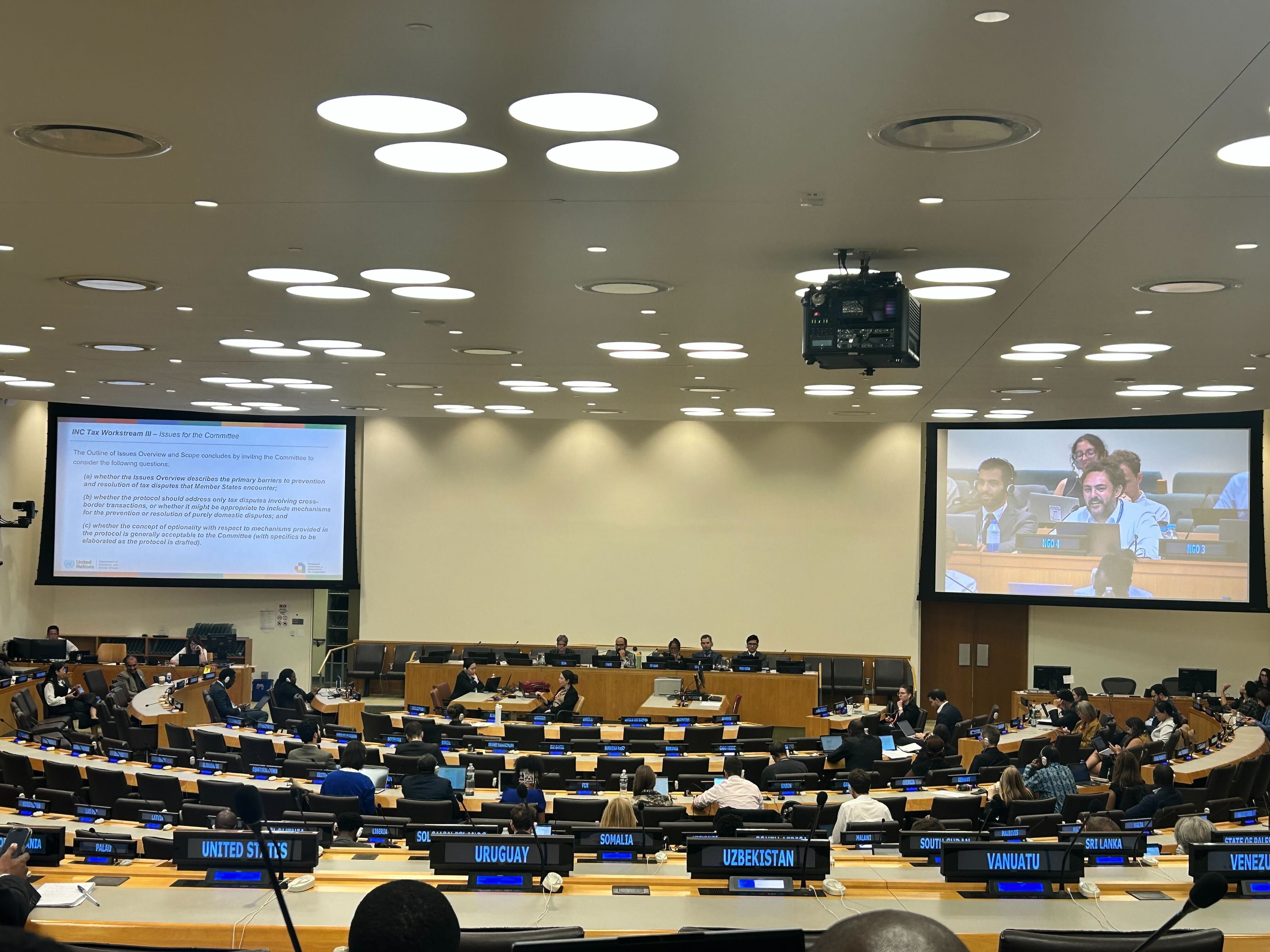
Here, we compile and share our notes and reflections from the first and second substantive sessions of negotiations toward a United Nations Tax Convention (UNTC). The updates highlight key debates and political dynamics that marked these initial stages of the process.
Monday, August 4, 2025 – Day 1
The first substantive session of the United Nations Tax Convention negotiations opened in New York with all Member States reaffirming their commitment to the process. Debate quickly emerged over the participation of civil society organizations (CSOs). Germany and Canada supported greater inclusion, while Türkiye raised objections to certain non-governmental organizations.
Group statements from the Africa Group, the Caribbean Community (CARICOM) and the European Union (EU) revealed early divides. Africa and CARICOM emphasized equity, governance and source-based taxation, while the EU highlighted consensus decision-making and avoiding duplication.
Global North countries stressed optionality, alignment with existing frameworks such as the Organisation for Economic Co-operation and Development (OECD), and high-level, non-self-executing commitments. In contrast, Global South countries called for fair allocation of taxing rights, the inclusion of new nexus rules and bolder structural reforms. Many called for governance elements to be embedded in the Framework Convention itself, including a Conference of the Parties (COP), a permanent secretariat and inclusive structures.
Civil society groups, including Tax Justice Africa, CCFD-Terre Solidaire and Justicia Fiscal, urged a rights-based and inclusive approach, challenging attempts to dilute ambition or limit participation.
Tuesday, August 5, 2025 – Day 2
Discussions turned to three commitments that could shape the foundation of the Convention. Global South countries, including India, Nigeria, Kenya and the African Union, pushed back against proposals to revise or drop the agreed Objectives and Principles in the Terms of Reference (ToR). They warned that doing so could unravel months of consensus. Kenya issued a strong warning against aligning the Convention with existing OECD frameworks, arguing this would preserve the status quo.
Jamaica criticized Global North countries for failing to appoint co-chairs for Workstreams I and II, despite prior agreement, raising concerns about their commitment to a fair process. Several Global North countries argued that Convention commitments should remain broad, optional and even non-binding. Global South states warned that this approach would undermine the Convention’s purpose.
Global South countries emphasized dispute prevention as a priority and cautioned against replicating investor-state arbitration systems, which have proven burdensome for developing countries. Many also underscored that international tax cooperation should contribute to sustainable development in all its dimensions, taking into account differences in countries’ capacities.
Wednesday, August 6, 2025 – Day 3
Day 3 focused on the fair allocation of taxing rights, one of the most politically charged issues in the process. Delegates generally agreed that the commitment should remain high-level, with details to be developed in protocols. However, Global North countries such as Germany, Canada, Switzerland and the United Kingdom called for explicit inclusion of economic principles like efficiency, neutrality and simplicity. Global South countries, including India, Kenya, Brazil and Tanzania, opposed this, stressing that such principles were already captured in the ToR and should not limit interpretation.
The meaning of “fairness” itself was contested. Colombia highlighted the need for definitions that ensure market jurisdictions can tax digital and remote services. Mexico urged use of agreed language from the “Compromiso de Sevilla,” emphasizing taxation “where economic activity occurs and value is created.”
Civil society groups demanded that all taxpayers, including high-net-worth individuals (HNWIs), be included under the Convention’s commitments. Kenya, Nigeria and Chile echoed this, pressing for explicit reference to “fair allocation of taxing rights.” Discussions also touched on information exchange, with Global South countries highlighting barriers such as capacity and resources.
Friday, August 8, 2025 – Day 5
The day’s discussions covered other commitments outlined in the ToR, including taxation of HNWIs, illicit financial flows and mutual administrative assistance. African countries highlighted the need for stronger exchange of information on beneficial ownership. The Bahamas raised concerns about broad definitions.
There was broad agreement that complex offshore structures, opaque ownership, tax competition and political capture hinder the taxation of wealthy individuals. CESR intervened to stress that commitments must cover both individuals and corporations, and that allocation of taxing rights should reduce inequalities within and between countries while advancing climate, sustainable development and human rights goals.
The need for global asset registries was raised, though the Secretariat cautioned about practical obstacles. Discussions also touched on administrative assistance, with varying national capacities highlighted and calls for safeguards that do not disadvantage Global South countries.
Monday, August 11 to Friday, August 15, 2025 – Days 6–10
The second week focused heavily on Protocol I (taxing cross-border services) and Protocol II (dispute prevention and resolution). Global North countries emphasized physical presence requirements and net-basis taxation, warning against distortion of trade and investment. Global South countries, led by Brazil, Ghana, Nigeria, Kenya and Chile, pushed for modern nexus criteria, gross-basis taxation and approaches that capture digital services without requiring physical presence.
Transfer pricing rules came under intense criticism, with many Global South states and CSOs arguing they are outdated and inequitable. Civil society, including the Global Alliance for Tax Justice (GATJ), Human Rights Watch (HRW) and Instituto de Estudos Socioeconômicos (INESC), called for unitary taxation, progressive approaches and public country-by-country reporting.
Dispute resolution was another dividing line. Global North states supported mandatory arbitration, while the Africa Group, India and others opposed it on grounds of cost and power imbalances. Alternative proposals included joint audits, mediation, UN-led panels and optional participation mechanisms. Civil society further highlighted the risks of investor-state dispute settlement (ISDS) mechanisms and advance pricing agreements (APAs), urging reforms to safeguard tax sovereignty.
By the final day, it was clear that while progress had been made on defining options, sharp divides remained between Global North and South. Concerns grew over fragmenting substance into optional protocols rather than embedding commitments in the Framework Convention itself. Negotiations will resume in November 2025 in Nairobi, where text proposals on dispute prevention, taxation and sustainable development, HNWIs and transparency mechanisms will be considered.